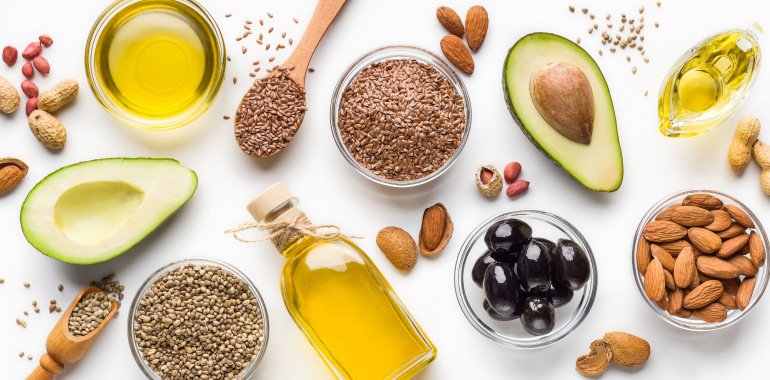Table Of Contents
What is Ketosis & Why is it Important?
Ketosis is a metabolic state where your body burns fat for energy instead of carbohydrates. This process happens when you significantly reduce carb intake, either through a low-carb diet or fasting. During ketosis, your body produces ketone molecules that serve as an alternative energy source when glucose is limited.
The benefits of ketosis extend beyond just weight loss. Research shows it can improve insulin sensitivity, increase energy levels, and potentially help with certain neurological conditions like Alzheimer’s disease. Fat adaptation occurs as your body becomes efficient at using fat stores as its primary fuel source.
However, ketosis isn’t appropriate for everyone. It requires careful food monitoring and dietary discipline. I recommend consulting with a healthcare professional or registered dietitian before making significant dietary changes, especially if you have underlying health conditions.

Signs You Are in Ketosis: From Ketone Levels to Keto Flu
Recognizing when you’ve entered ketosis helps confirm your dietary efforts are working. The most definitive sign is elevated ketone levels in your blood, which you can measure using urine strips, blood testing kits, or breath analyzers. These tools provide objective confirmation that your metabolism has shifted.
Beyond testing, your body offers several indicators that ketosis is occurring. Many people experience increased mental clarity, reduced hunger, and stable energy levels throughout the day. You might notice changes in your taste preferences and a significant decrease in cravings for sugary foods.
The transition into ketosis isn’t always smooth. Some people experience what’s commonly called the “keto flu” – a collection of temporary symptoms that can include headaches, fatigue, irritability, and digestive issues. According to the National Library of Medicine, these symptoms typically subside within a few days as your body adapts to using ketones for energy.
Common signs you’re in ketosis include:
- Measurable ketones: Using blood meters, urine strips, or breath analyzers to confirm ketone production
- Decreased appetite: Natural appetite suppression that can help with calorie control
- Increased thirst: Higher water requirements as your body processes fat for fuel
- Keto breath: A fruity or metallic taste/smell caused by acetone (a type of ketone) being expelled through breath
- Initial fatigue: Temporary energy dips as your metabolism adapts to using fat instead of glucose
- Enhanced focus: Many report improved mental clarity and concentration once fully adapted
- Digestive changes: Temporary shifts in bowel habits as your gut adapts to a new nutrient profile
Remember that individual experiences with ketosis vary considerably. If you have concerns about your symptoms, consult with a healthcare professional for personalized guidance.
Benefits of Ketosis: Weight Loss to Mental Clarity
Weight loss
The ketogenic diet has gained popularity as an effective weight management approach. Research published in the National Library of Medicine confirms its effectiveness for weight reduction, particularly during the initial adaptation phase. By restricting carbohydrates, your body shifts to burning stored fat, which can lead to significant weight loss.
When following a ketogenic diet, many people report increased energy levels and better athletic performance once they’ve fully adapted. The Cleveland Clinic notes that this energy boost comes from the body’s improved ability to access and utilize fat stores efficiently.
Improved blood sugar control
For those managing diabetes or insulin resistance, ketosis can be a valuable addition to their treatment plan. By limiting carbohydrate intake to 20-50 grams daily, your body reduces its reliance on glucose and insulin production. This metabolic shift improves insulin sensitivity and helps regulate blood sugar levels.
Research published in the journal Frontiers in Nutrition shows that ketogenic diets, especially when combined with regular exercise, can significantly improve glycemic control. The reduced carbohydrate intake prevents blood sugar spikes and crashes, creating more stable energy levels throughout the day.
Increased energy
After the initial adaptation period, many people experience remarkably stable energy levels on a ketogenic diet. Unlike the energy fluctuations common with high-carbohydrate diets, ketosis provides a consistent fuel source from your body’s fat stores. This leads to fewer energy crashes and reduced afternoon fatigue.
The energy benefits extend beyond just daily functioning. Many athletes and active individuals report improved endurance and recovery when properly adapted to a ketogenic diet, though performance effects vary by individual and activity type.
Improved mental clarity
One of the most frequently reported benefits of ketosis is enhanced cognitive function. Research published in Neuroscience Letters reveals that limiting carbohydrate intake and becoming “fat-adapted” can improve mental clarity, focus, and concentration. Many people describe this effect as a lifting of “brain fog.”
According to the Cleveland Clinic, our brains may actually function more efficiently on ketones than on glucose. This improved brain function can translate to better productivity, sharper thinking, and improved mood stability for many individuals in ketosis.
Also, read – Fasting for Mental Clarity
Reduced inflammation
Ketosis shows promising effects on systemic inflammation, which underlies many chronic health conditions. By shifting your metabolism away from glucose dependency, ketosis creates a unique metabolic environment that can help reduce inflammatory markers throughout the body.
The anti-inflammatory benefits of ketosis make it a potential natural intervention for managing conditions like arthritis, inflammatory bowel disease, and even some autoimmune disorders. This reduction in inflammation contributes to the overall feeling of wellbeing many experience in ketosis.
Potential therapeutic applications
The therapeutic potential of ketosis extends into neurological health. Researchers have found that ketones provide an alternative energy source for brain cells, which may benefit conditions like Alzheimer’s disease. Studies in the National Library of Medicine highlight how ketosis might help compensate for impaired glucose metabolism in affected brain regions.
Beyond neurodegenerative conditions, research in Frontiers in Psychiatry suggests ketosis may benefit certain mental health conditions. As our understanding grows, ketosis is emerging as a complementary approach to traditional treatments, offering symptom management without many of the side effects associated with pharmaceutical interventions.
How Long Does It Take to Reach Ketosis? Timeframes and Variables
The journey to ketosis varies for each person based on several factors including current diet, activity level, and individual metabolism. For most people, ketosis begins within 2-7 days after significantly reducing carbohydrate intake. Exactly at what hour does ketosis start depends on your body’s existing glycogen stores and how quickly you deplete them.
Typically, if you consume between 20-50 grams of carbs daily, you’ll enter ketosis within 2-4 days. However, factors like age, metabolic health, and your previous diet can influence this timeline. Those transitioning from a high-carb diet may take longer than those already limiting carbohydrates.
It’s important to distinguish between entering ketosis and becoming fully keto-adapted. While your body may begin producing ketones within days, the complete metabolic shift to efficient fat-burning mode takes longer – usually 3-6 weeks. During this adaptation period, your mitochondria increase in number and efficiency to better utilize ketones for energy.
The question of how long does ketosis last depends largely on your dietary choices. You’ll remain in ketosis as long as you maintain very low carbohydrate intake. Once you increase carbs above your personal threshold (typically 50 grams but varies by individual), you’ll gradually exit ketosis as your body shifts back to using glucose as its primary fuel.
Also, read – Signs of Autophagy: Health Benefits & Symptoms
Does Ketosis Make You Tired? Understanding the Keto Flu
Initial fatigue is one of the most common experiences when first entering ketosis. This temporary energy dip, often called the “keto flu,” typically lasts a few days to a week as your body adapts to using fat instead of carbohydrates for fuel. The National Library of Medicine recognizes this transition period as a normal adaptation phase.
During this adjustment period, you might experience headaches, irritability, nausea, dizziness, or muscle cramps alongside fatigue. These symptoms occur because your body is recalibrating its entire energy production system—transitioning from readily available glucose to metabolizing fat and producing ketones.
Several factors can intensify keto flu symptoms, including electrolyte imbalances, dehydration, and sudden carbohydrate restriction. I recommend increasing your intake of sodium, potassium, and magnesium during this transition to help minimize these effects. Staying well-hydrated is equally important.
The good news is that once your body fully adapts to ketosis, most people experience the opposite of fatigue—reporting increased energy, improved endurance, and more stable energy levels throughout the day. If tiredness persists beyond two weeks, it’s worth consulting with a healthcare provider to rule out other potential causes.
How to Get Into Ketosis Fast: Essential Strategies
If you’re looking to get into ketosis fast, several evidence-based strategies can accelerate this metabolic shift. Combining multiple approaches can help you reach ketosis in as little as 1-3 days rather than the typical 3-7 day timeline.
The foundation of rapid ketosis is severely restricting carbohydrates—typically to under 20 grams daily. This forces your body to quickly deplete glycogen stores and turn to fat metabolism. Focus on consuming high-quality fats like avocados, olive oil, and fatty fish while maintaining moderate protein intake.
To increase ketosis fast, incorporate intermittent fasting into your routine. Even a 16:8 fasting schedule (16 hours fasting, 8 hours eating) can accelerate glycogen depletion and ketone production. For more rapid results, some people use 24-hour fasts to jumpstart ketosis.
Strategic exercise, particularly high-intensity interval training or strength training, can help deplete glycogen stores more quickly. Working out in a fasted state is particularly effective for accelerating the transition to ketosis.
Supplementation with medium-chain triglycerides (MCTs) provides readily available fats that your liver can quickly convert to ketones. MCT oil or powder can give your ketone levels a significant boost, especially when consumed in the morning or before exercise.
5 Ways to Enter Ketosis Faster
High-intensity Exercise for Rapid Ketosis
High-intensity exercise is a powerful tool to accelerate ketosis. When you engage in intense workouts, your body rapidly depletes its glycogen stores, forcing fat metabolism to kick in sooner. Activities like HIIT (High-Intensity Interval Training), sprint intervals, or heavy weightlifting are particularly effective.
For maximum benefit, exercise in a fasted state—ideally in the morning before eating or after several hours without food. This amplifies the glycogen-depleting effect and can significantly speed up the transition to ketosis. Just 20-30 minutes of high-intensity exercise can make a substantial difference in how quickly your body shifts to fat-burning.
MCTs: Your Shortcut to Ketone Production
Medium-chain triglycerides (MCTs) offer a unique advantage for anyone seeking to enter ketosis quickly. Unlike other fats, MCTs are rapidly absorbed and transported directly to the liver where they’re efficiently converted into ketones. This provides an immediate energy source while simultaneously encouraging your body to adapt to fat metabolism.
You can find MCTs in coconut oil (which contains about 50% MCTs), but for faster results, consider a pure MCT oil or powder supplement. Start with small amounts (1 teaspoon) and gradually increase to avoid digestive discomfort. Adding MCTs to morning coffee or pre-workout drinks can help maintain energy levels while transitioning to ketosis.
Intermittent Fasting to Accelerate Ketosis
Intermittent fasting works synergistically with a ketogenic diet to speed up ketosis. During fasting periods, your body quickly depletes glucose stores and shifts to fat metabolism. Even a 16:8 fasting schedule can dramatically accelerate this transition compared to eating the same ketogenic foods spread throughout the day.
For those seeking even faster results, extending the fasting window to 20 hours or implementing a 24-hour fast can jumpstart ketosis. During fasting periods, stay well-hydrated and consider bone broth or electrolyte supplements to maintain mineral balance. This approach helps answer the question of how quickly you can enter ketosis—potentially reducing the timeline from days to hours.
Drastically Reducing Carbohydrate Intake
The most fundamental strategy for rapid ketosis is severely limiting carbohydrate consumption. While standard ketogenic diets typically allow up to 50 grams of carbs daily, restricting to under 20 grams will get you into ketosis significantly faster. Focus on eliminating all obvious sources of carbohydrates—bread, pasta, rice, potatoes, sugar—while also being vigilant about hidden carbs in sauces, condiments, and processed foods.
Track your carbohydrate intake meticulously during this initial phase. Even small amounts of excess carbs can delay ketosis. Prioritize green leafy vegetables for your limited carb allowance, as they provide essential nutrients with minimal impact on blood sugar. This strict approach is temporary—once you’re firmly in ketosis, you can experiment with slightly higher carb limits based on your personal tolerance.

Eating Keto But Not in Ketosis: Troubleshooting Your Diet
If you’re following a ketogenic diet but not achieving ketosis, several common culprits might be responsible. Hidden carbohydrates often sneak into “keto-friendly” products, sauces, and condiments. Even some vegetables contain more carbs than you might expect. Detailed food tracking can help identify these hidden sources.
Protein overconsumption is another frequent issue. While protein is essential, excessive amounts can convert to glucose through gluconeogenesis, potentially keeping you out of ketosis. Most people need only 0.6-0.8 grams of protein per pound of lean body mass.
Individual carbohydrate tolerance varies significantly. While 50 grams daily works for many people, others need to stay under 20-30 grams to maintain ketosis. Factors like insulin sensitivity, activity level, and metabolic health all affect your personal carbohydrate threshold.
Even without full ketosis, a low-carb diet offers health benefits. Focus on these nutritious ketogenic foods:
- Healthy fats. Prioritize olive oil, avocados, nuts, grass-fed butter, and fatty fish to provide clean energy sources and essential nutrients.
- Non-starchy vegetables. Fill your plate with leafy greens, broccoli, cauliflower, zucchini, and asparagus for fiber and micronutrients.
- Quality protein. Choose grass-fed meats, pastured eggs, wild-caught fish, and organic tofu in appropriate portions.
- Low-sugar fruits. Enjoy small portions of berries, which offer antioxidants with relatively few carbohydrates.
- Keto-friendly dairy. Incorporate full-fat cheese, cream, and Greek yogurt in moderation, watching for hidden carbs.
Low Ketones After Fasting: Causes and Solutions
Experiencing low ketone levels despite fasting can be frustrating. Several factors might explain this unexpected result. Insufficient fasting duration is a common reason—some people need 24+ hours of fasting to significantly elevate ketones, especially when first adapting to fat metabolism.
Previous carbohydrate consumption plays a major role. If you consumed high-carb meals before starting your fast, your body must first deplete those glycogen stores before ramping up ketone production. This process can take longer than expected, particularly if you’re not yet fat-adapted.
Surprisingly, excessive protein intake can interfere with ketosis through gluconeogenesis—the conversion of protein to glucose. Even during fasting, if your last meal was very high in protein, this process might delay ketone production.
To address low ketones after fasting, try these approaches:
- Extend fasting duration: Consider lengthening your fast if medically appropriate for your situation.
- Reduce pre-fast carbohydrates: Minimize carbs for 1-2 days before planned fasting periods.
- Stay hydrated with electrolytes: Proper mineral balance supports ketone production during fasting.
- Incorporate light exercise: A brisk walk or light workout can help deplete glycogen and accelerate ketosis.
- Manage stress levels: High cortisol from stress can inhibit ketone production even during fasting.
Remember that ketone levels fluctuate naturally throughout the day. A single low reading doesn’t necessarily indicate a problem with your fasting approach. Consistent monitoring over time provides more valuable insights than isolated measurements.
How Long Does Ketosis Last? Maintaining the Fat-Burning State
The question of how long does ketosis last has two dimensions: how long you can stay in ketosis and how long the benefits persist if you exit ketosis temporarily. In theory, ketosis can last indefinitely as long as you maintain very low carbohydrate intake—typically below 50 grams daily for most people.
Many people successfully maintain ketosis for months or even years. The key is consistent dietary adherence and developing sustainable eating patterns that fit your lifestyle. As your body becomes more fat-adapted over time, you may find you can tolerate slightly higher carbohydrate levels while remaining in ketosis.
Brief departures from ketosis—such as having a higher-carb meal—will temporarily interrupt the fat-burning state. For most fat-adapted individuals, returning to ketosis happens much faster after these occasional departures, often within 24-48 hours instead of the initial 3-7 days.
To maintain long-term ketosis successfully:
- Develop a repertoire of satisfying, nutrient-dense keto meals you genuinely enjoy
- Plan for social situations and travel to maintain dietary consistency
- Consider cyclical approaches if helpful for your lifestyle or exercise regimen
- Monitor your ketone levels periodically to confirm you’re maintaining ketosis
- Adjust your carbohydrate threshold based on your individual response
The metabolic flexibility developed through long-term ketosis can provide lasting benefits even if you eventually transition to a more moderate carbohydrate intake. Many people find they maintain improved insulin sensitivity and efficient fat metabolism even with a more flexible approach to nutrition.
Conclusion
Ketosis represents a powerful metabolic shift that typically begins 2-4 days after restricting carbohydrates to 20-50 grams daily. Once established, this fat-burning state offers numerous potential benefits including weight management, mental clarity, steady energy levels, and possible therapeutic effects for certain conditions.
The transition period might include temporary discomfort as your body adapts, but strategies like proper hydration, electrolyte supplementation, and gradual carbohydrate reduction can make the process smoother. To get into ketosis fast, combine strict carbohydrate limitation with intermittent fasting, strategic exercise, and possibly MCT supplementation.
For optimal results with ketosis, I recommend establishing clear health goals beforehand and consulting with a qualified healthcare professional or registered dietitian. This personalized guidance ensures your approach aligns with your specific health needs and circumstances.
With patience and consistent implementation of evidence-based strategies, you can successfully enter and maintain ketosis, potentially experiencing significant improvements in both physical and mental wellbeing along the way.











Thank you for answering the question how long does it take to enter ketosis. It is important to understand what stage the body is at during a diet.
Hello, Eliza!
You’re welcome! Understanding the body’s stages during a diet is indeed crucial.💪